Rooted in Care, Growing with Innovation

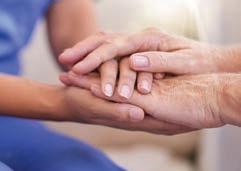
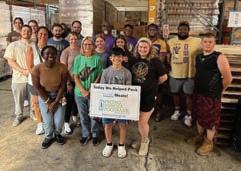
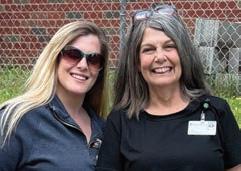









From weekend warriors to everyday heroes, joint pain and injuries shouldn’t slow you down. Marshall Health Network offers advanced treatments, minimally invasive surgery options, and personalized care plans to help you heal faster and move better.
Joint replacement & reconstruction
• Sports medicine & injury recovery
• Problems of the hand, foot, wrist, arm, leg or hip Torn ligaments, sprains & strains
• Fractures & dislocations
• Pediatric orthopedic conditions, including scoliosis
Discover more – discover what’s possible with orthopedic care at Marshall Health Network.

Message from Scott Raynes President & CEO Marshall Health Network
Just like our hospitals, many of us share strong roots in our communities. I’m a proud West Virginia native who grew up in Oak Hill, and even though my career has taken me to Tennessee, Florida, and Georgia, there’s truly nothing like coming home. Since joining Marshall Health Network in March 2025, I’ve felt an overwhelming sense of pride to once again serve my home state.
When I arrived, I focused on listening and learning. I’ve had the privilege of meeting with dedicated team members, touring our facilities, visiting with community members, and gaining a deeper understanding of what makes our region so special. What I’ve found is a remarkable group of professionals who are passionate about their work and deeply committed to the people they serve.
That passion and pride are at the heart of our success. It’s what fuels our Mission: Advancing Health Inspiring Hope. Serving You
Marshall Health Network is rooted in its history but continually evolving. We’re expanding access to care, introducing new technologies, and bringing leading-edge research and treatments closer to home. Whether it’s robotics in the operating room, advanced AI imaging, or specialized outreach clinics in underserved areas, our commitment remains the same: to provide the highest quality care right here in our communities.
In this edition, you’ll discover stories that highlight our strong legacy and bold future—our journey from deep community roots to becoming a regional leader in innovation. You’ll read about the awards and accreditations that validate our high standards, hear patient stories that inspire us, and learn about new services designed to meet you where you are.
Thank you for your continued trust and support. I’m truly honored to be part of this exceptional team and this incredible community.
Warm regards,

Scott Raynes President & CEO


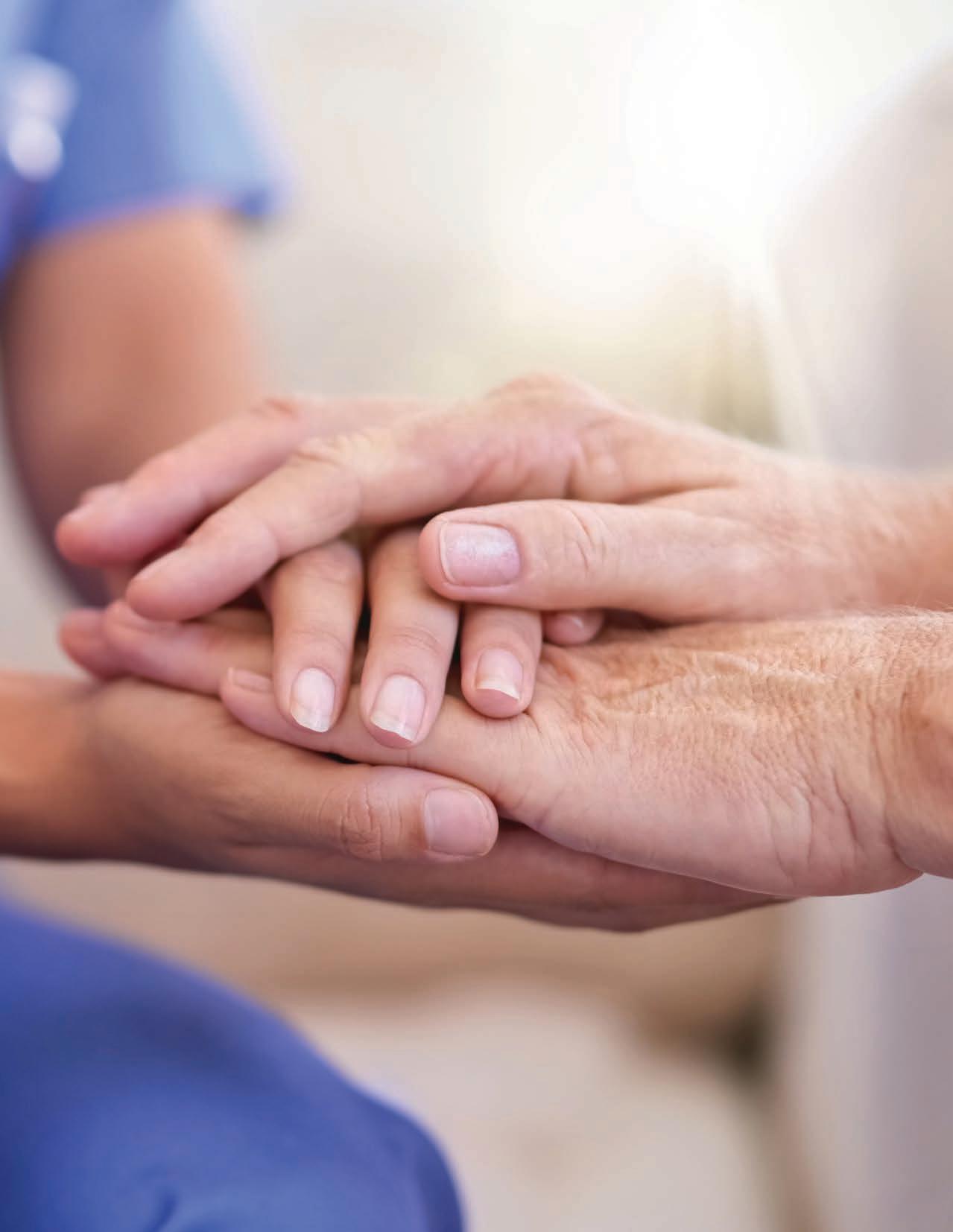
Health care in the Tri-State region has long been shaped by the strength, vision, and resilience of our community. From humble beginnings to medical innovation, Marshall Health Network’s hospitals - Cabell Huntington Hospital, Hoops Family Children’s Hospital, St. Mary’s Medical Center, and Rivers Health - stand as living testaments to what can be accomplished when a community comes together with a shared commitment to care for its own.
In the 1950s, Huntington was a city on the rise but lacked a modern acute care facility to meet its growing needs. In response, the people of the region rallied behind a $3 million bond issue, and in 1956, Cabell Huntington Hospital opened its doors, built with purpose and powered by civic resolve.
As health care demands evolved, so did the hospital. In the 1980s, it expanded critical services with the region’s only Birthing Room and High-Risk Labor Room, plus well-baby and Neonatel Intensive Care (NICU) units. A transformative moment came in 1988 when the hospital transitioned from a public facility to a private not-for-profit, ensuring long-term sustainability while preserving its community-first mission.
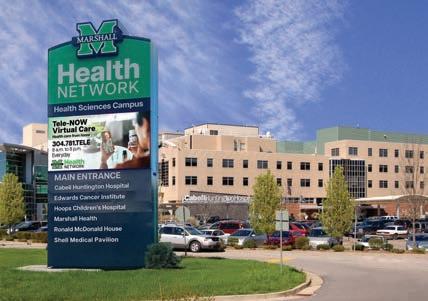
Through a thriving partnership with the Marshall University Joan C. Edwards School of Medicine, Cabell Huntington Hospital became home to the Marshall University Medical Center and the Edwards Comprehensive Cancer Center, combining research, education, and advanced care. The 2007 opening of the North Patient Tower further fortified its role as a regional leader, adding private patient rooms, trauma services, and enhanced NICU capacity.
Yet even as services grew, by 2009, many of local children still had to leave the region each year for specialized care. Recognizing this gap, the hospital launched a campaign to keep care close to home. With strong support from the community and a pivotal $3 million gift from the Hoops family, construction of the Hoops Family Children’s Hospital began in 2012.
Pediatric specialists and the new facility ensure that more children can receive high-quality, family-centered treatment close to home. Hoops Family Children’s Hospital provides care to all children, regardless of their ability to pay. With over $30 million in unreimbursed care delivered annually, continued community support remains essential to sustain and expand services. The hospital’s vision is to stay at the forefront of pediatric care in the region, offering the latest technology and compassionate care to every child in need.
Today, Cabell Huntington Hospital continues to serve as one of West Virginia’s largest tertiary hospitals, anchored in a tradition of care and guided by community leadership. Its story is a reflection of the region’s enduring strength: when our neighbors need care, we build the future—together.

St. Mary’s Medical Center traces its remarkable journey back to 1912, when four Pallottine Sisters survived both the Titanic and a deadly train accident while making their way to WV. Their mission led them to open a school and eventually a hospital in Richwood. By 1924, their journey led them to Huntington, where, with limited funds but boundless faith, they purchased and restored two buildings, establishing a 35-bed hospital with a mission of caring for all, regardless of ability to pay.
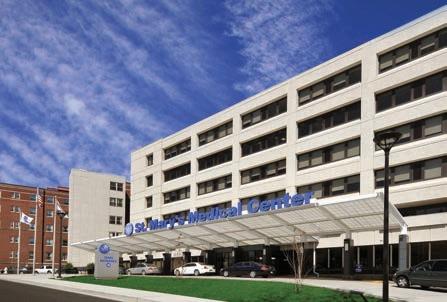
Through decades of expansion and progress, St. Mary’s became a beacon of excellence. By the late 1940s, the hospital had grown tenfold, launched nursing and intern training programs, and earned national recognition. Innovation remained at its core: from the region’s first openheart surgery to state-of-the-art outpatient centers, education facilities, and a pioneering Clinical Pastoral Education program.
In 2018, the legacy of the Pallottine Sisters took a new form when St. Mary’s united with Cabell Huntington Hospital to become part of what is now Marshall Health Network. Even through this transition, the hospital’s mission never wavered. St. Mary’s has continued to grow, expanding services by acquiring Huntington Internal Medicine Group (HIMG) and Scott
Orthopedic Center, and bringing modern health care access to surrounding communities. For more than 100 years, St. Mary’s has exemplified what it means to serve with both skill and heart. Its story is one of unwavering devotion—rooted in compassion, shaped by faith, and nurtured by the community it calls home.
In 1959, another chapter of community-driven care began when Pleasant Valley Hospital— now known as Rivers Health—was founded to serve the people of Mason and Jackson counties in West Virginia and neighboring Gallia and Meigs counties in Ohio. Created by the community, for the community, Rivers Health remains steadfast in its commitment to deliver high-quality, local health care. Today, Rivers Health offers inpatient, outpatient, emergency, and primary care services. And while its name has changed, its purpose has not. It continues to serve as a critical access point for rural families, ensuring health care is accessible, personalized, and rooted in trust.


While our hospital stories began in different eras and places, each was born from the same source: a deep belief that our community deserves the very best in care.
As we look ahead, that commitment only grows stronger. With continued investment in innovation, education, and compassionate service, Marshall Health Network is proud to stand with the community—as a partner, a neighbor, and a place where healing begins. n
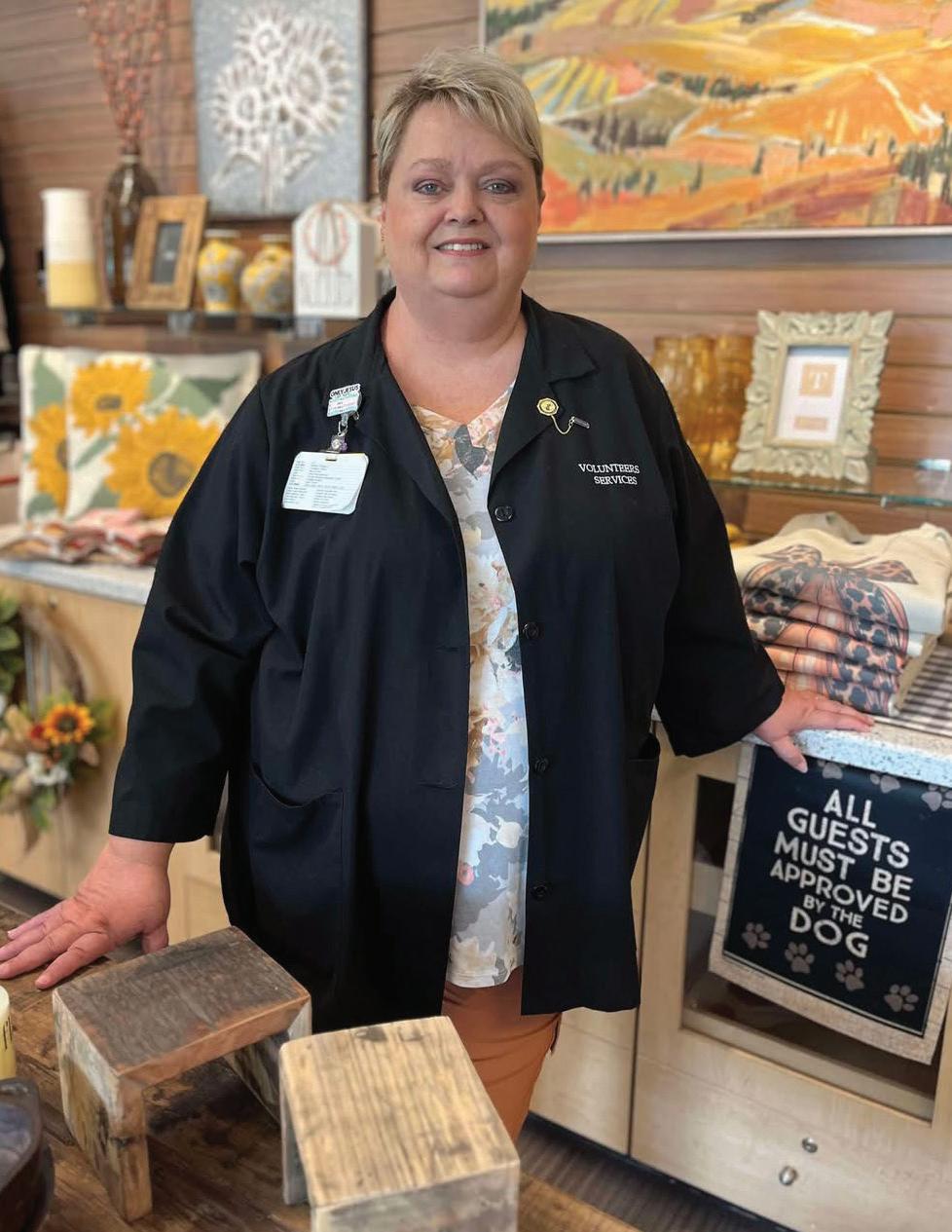
Marshall Health Network volunteers are the heart and soul of our care community. Every day, their dedication and compassion brighten the lives of patients, families, and staff, making a real difference in the hospital experience.
Volunteers provide more than hands-on support—they offer hope, comfort, and connection when it’s needed most. Their kindness eases anxiety for patients, provides encouragement to families, and lifts the spirits of health care staff working tirelessly behind the scenes. The ripple effect of their generosity creates a more caring, welcoming environment for everyone who walks through our doors.

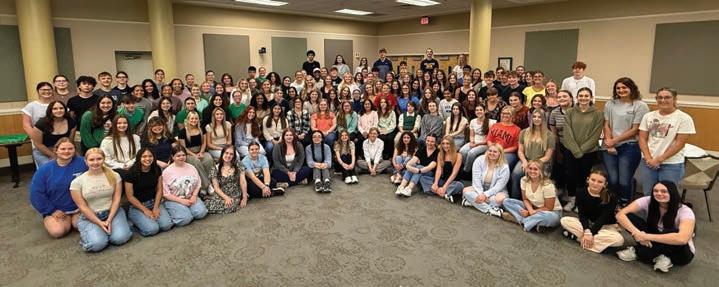
In 2025, our 259 adult volunteers generously gave over 66,000 hours of their time, supporting 75 events and departments throughout our network. Their presence offers comfort, support, and a helping hand where it’s needed most.
We’re also proud of our VolunTeen program, welcoming young volunteers aged 14 to 17 each spring. This year, 177 enthusiastic teens joined us, eager to contribute and learn the value of service.
259 Volunteers served last year
66,298 Hours served this year 75 Events/ departments served
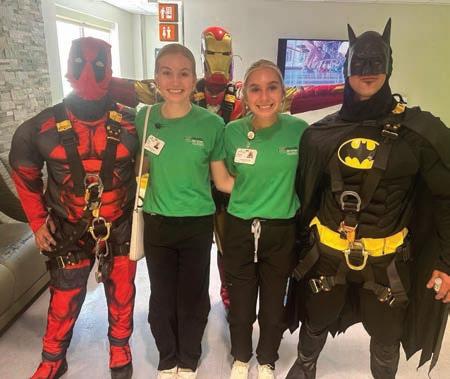
$2,220,320 In salaries/ cost saved
Beyond their time and energy, volunteers actively raise funds for important projects that directly benefit patients and facilities. Thanks to their efforts, we’ve been able to provide new transport wheelchairs, a critical care ambulance, heart pillows for new cardiac patients, informational kits for patients with breast cancer, and blanket warmers for the oncology unit. They also support major initiatives like the North Patient Tower construction at Cabell Huntington Hospital and the Kids ID program, which gives parents the opportunity to have their child’s fingerprint and photo taken and printed on a wallet-sized ID badge that they can keep in case of an emergency.
If you’re looking for a meaningful way to give back and positively impact lives, consider joining our volunteer family. Your time and heart can bring comfort and hope to those who need it most while enriching your own life in unexpected ways.
Visit www.marshallhealthnetwork.org today to learn more and start your volunteer journey with us. n
Caring for people goes far beyond hospital walls. Marshall Health Network (MHN) provides advanced medicine and compassionate care to the Tri-State region. But our mission doesn’t end with treatment. We’re committed to creating healthier, more resilient communities by working hand-in-hand with the people and organizations who know them best.
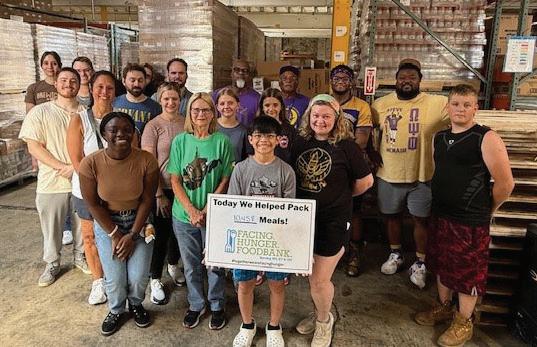
MHN’s approach to community health is grounded in connecting people to services, support, and each other. This means addressing not only clinical needs but also the social determinants that shape health outcomes: housing, food access, education, employment, and safety. We actively engage with local and regional partners to assess needs, design solutions, and implement community health initiatives that make a lasting impact.
From 2023 to 2025, MHN has supported nearly 100 community-based organizations that share our passion. These partnerships span across different industries, such as health, education, the arts, youth development, cultural preservation, and more - each one a reflection of our belief that community well-being is built through collaboration.
Among the many organizations supported are:
• Facing Hunger Foodbank, ensuring families have access to nutritious meals
• Dress for Success, empowering women with the tools to achieve economic independence
• Autism Services of River Cities and Lily’s Place, providing critical care and advocacy for vulnerable populations
• Girls on the Run, nurturing physical, emotional, and social development in young girls
• The Black Appalachian History and Cultural Center and Carter G. Woodson Memorial Foundation, celebrating cultural identity and community pride
• Harmony House and Huntington City Mission, offering shelter, resources, and hope to those experiencing homelessness
• First Stage Theatre Company, Marshall Artist Series, and Huntington Symphony Orchestra, enriching the region’s cultural landscape



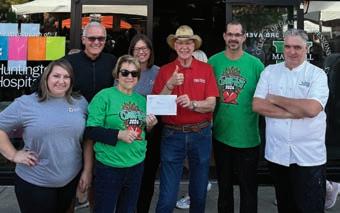


Whether it’s through supporting local festivals, advancing rural health initiatives, funding educational programs, or championing mental health awareness, Marshall Health Network’s outreach underscores a steadfast belief: community health is collective health.
Through this work, we’re is not just treating illness, we’re helping prevent it. We’re not just investing in programs; we’re investing in people. These partnerships are a testament to our belief that by lifting each other up, we all rise.
Our roots in the Tri-State are deep, and our commitment is growing stronger every year. Because at Marshall Health Network, we’re more than a health system—we’re your neighbors, your partners, and your advocates for a healthier tomorrow.
To learn more about MHN’s community outreach, visit www.marshallhealthnetwork. org/connect. n
The phrase “treating you like family” takes on a literal meaning for many employees and Marshall Health Network. Across our hospitals and clinics, brothers and sisters, parents and children, spouses, and even cousins work side by side, united not only by their bloodlines but by a shared passion for caring for others.
For many in the system, working in health care has been a generational experience.
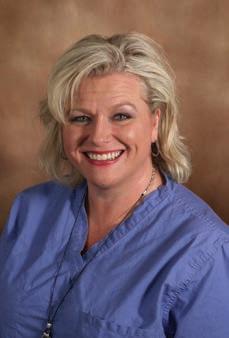
Amy Adams, BSN, RN-BC, Ambulatory Gastroenterology and Endoscopy Director for MHN, is a graduate of the St. Mary’s School of Nursing and has spent her 30-year career serving patients at St. Mary’s Medical Center (SMMC). Her mother, the late Margaret Donley, also a graduate of St. Mary’s School of Nursing, dedicated her entire career to SMMC, retiring as the Director of Organizational Development and Learning in 2015. The family later established a scholarship fund in her honor through St. Mary’s School of Nursing to support future generations of caregivers.
“My mom loved being a nurse and was a champion for nurses,” Adams said. “Being a nurse was also my calling. We were both blessed to find a job we were made to do. So many people go through life just doing a job to make money. My mom did her job to make a difference and that’s the same philosophy I follow.”
Adams’ son will begin his nursing career at St. Mary’s this August, and she said she hopes he loves being a nurse as much as she does.
Both of Thomas Mayes’, RN, Medical Malpractice Nurse Paralegal for MHN, parents, Charles Mayes and Lynda Williams, worked for SMMC, with both retiring after 40-plus years of service. Mayes is now in his 24th year of service.
“I can honestly say that in my 49 years of life, every meal that has been put on my table has been courtesy of SMMC/MHN,” Mayes said. “I have always had great pride in St. Mary’s and knew I wanted to become a nurse since I was 12 years old and work my entire career at this facility.”
“I can honestly say that in my 49 years of life, every meal that has been put on my table has been courtesy of SMMC/MHN.”
– Thomas Mayes, RN Marshall Health Network
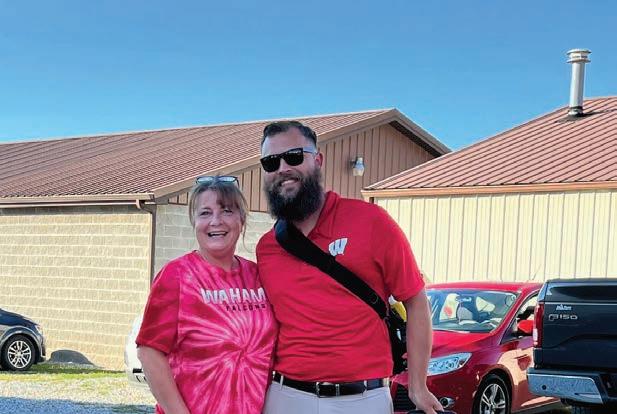
“You’re not just family by marriage; you are teammates in one of the most selfless, human professions there is. Seeing my mother-in-law in action, how she advocates for patients, how she handles stress, and how she uplifts a team can be inspiring.”
– Katie Stewart Rivers Health
Gabe Roush, sports medicine manager at Rivers Health, was inspired to pursue a career in health care after watching his mother, Teri Roush’s career, which began at Pleasant Valley Hospital, now Rivers Health.
“Over the years, she’s served in various capacities, including inpatient, outpatient and home health,” Roush said. “During my high school years, she also supported Wahama High School’s football program as the team’s ‘limited trainer.’ Her long-standing service as a physical therapy assistant and her commitment to supporting local athletics shaped my path into sports medicine.”
Roush said as manager of sports medicine at Rivers Health and athletic trainer for Mason County schools, he carries the values his mother instilled in him – dedication, service and a deep commitment to community-focused care.
Katie Stewart works side-by-side with her mother-in-law, Carolyn Stewart, CCME, office lead in the Orthopedics department at Rivers Health. Stewart said having a family member as a colleague means you have someone who truly understands your work-life stress, and she values the support.
“Sharing such meaningful work experiences has deepened our relationship beyond the typical in-law dynamic,” she said. “We’re not just family by marriage; we are teammates in one of the most selfless, human professions there is. Seeing my mother-in-law in action, how she advocates for patients, how she handles stress, and how she uplifts a team is inspiring.”
As for Carolyn Stewart, she said it is an honor to work closely with her daughter-in-law.
“It’s nice knowing we can depend on each other,” Carolyn Stewart said. “We can support each other because we both know how demanding the medical field can be. We know each other’s strengths and weaknesses. We are blessed to have this opportunity. With us both working in the medical field here at Rivers Health, maybe my granddaughters will be inspired to work here, also.”
Many within MHN are able to work with their children.
Robin Perry, Supply Chain Director at Rivers Health, works with her daughter, Marley Mitchem, a patient access representative, just as Perry used to work with her own mother.
“You can say it’s a family tradition,” Perry said. “Rivers Health is truly family-oriented, we treat everyone like family, but for my daughter and me, it truly is family. I hope she can retire from here as her grandmother did.”

Bill Casto, buyer, supply chain operations at SMMC, often gets to see his daughter, Sarah Conwell, who works in CVICU.
“I run into her occasionally, and she always seems upbeat about her job,” Casto said. “We both really enjoy working here. It’s a pride thing for me for both of us to share a workplace.”
Siblings also have the pleasure of working together, like Angie Snider, RN, and her brother Shawn, a dietary aid, who both work at SMMC.
“Working at SMMC is like working with family, but actually working with my brother makes my heart happy,” Angie said. “As his sister, it makes me proud to hear patients or other coworkers brag about him doing a good job. I take pride in my work helping others and I am thankful to work with Shawn and see firsthand the difference he makes.”

Life-long residents of Point Pleasant, sisters Tonya Shobe and Brandie Connolly have dedicated their careers to providing high-quality, compassionate health care in their hometown community.
Tonya Shobe, currently serving as Employee Relations Manager in Human Resources, began her career with the hospital in 1991. For the past 13 years, she has been an integral part of the Human Resources team, supporting staff and fostering a positive workplace culture. Her sister, Brandie Connolly, joined the hospital in 1993 as a phlebotomist and is now the Phlebotomy Supervisor and Development Coordinator. With nearly 30 years of service, she has worked in various clinical areas, though her passion is phlebotomy.
“We both took time away throughout the years to prioritize family, but we each chose to return to Pleasant Valley Hospital – now Rivers Health – because of the organization’s enduring commitment to ‘families caring for families,’” Shobe said.
This family legacy of service continues with their sister-in-law, Lori Cochran, who joined Rivers Health in May as Director of Physician Services. With 14 years of healthcare management experience, Lori brings a wealth of professionalism, leadership, and strategic insight to the team.
At Marshall Health Network, families are more than just visitors—they’re caregivers, colleagues, and the heart of our mission. And whether connected by DNA or dedication, our teams are united in delivering exceptional care with compassion. n
“Working at SMMC is like working with family, but actually working with my brother makes my heart happy.”
– Angie Snider, RN St. Mary’s Medical Center
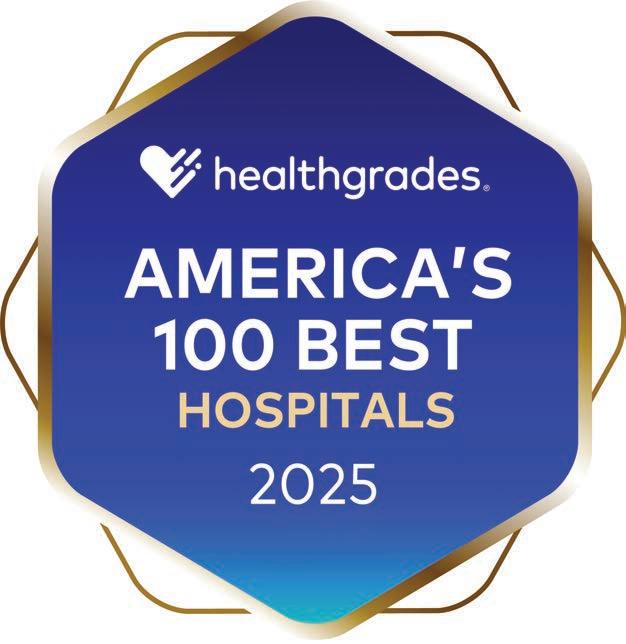

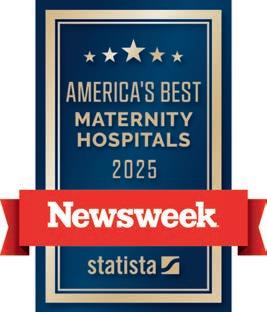
Marshall Health Network (MHN) is committed to providing the highest quality patient care to everyone. We take pride in our people and the services they provide. And we strive to be a source of pride for the communities we serve. But don’t just take our word for it. Our people and our hospitals have been nationally recognized for that commitment with numerous awards and recognition.
Cabell Huntington Hospital (CHH) is one of America’s 100 Best Hospitals for 2025 According to new research released by Healthgrades, this achievement puts CHH in the top 2% of hospitals nationwide for overall clinical performance across the most common conditions and treatments. This is the third consecutive year the hospital has been among America’s 100 Best Hospitals.
In 2025, the Maternity Center at Cabell Huntington Hospital (CHH) earned national acclaim, receiving three prestigious awards that underscore its commitment to exceptional care for mothers and babies. The recognition highlights the center’s dedication to clinical excellence, safety and patient satisfaction.

• 2025 High Performing Hospital for Maternity Care by U.S. News & World Report, the global authority in hospital rankings and consumer advice. This is the highest award a hospital can earn as part of U.S. News’ Best Hospitals for Maternity Care annual study.
• State Gold Standard Award in Castle Connolly’s 2025 Top Hospital Awards, the highest level of recognition, for C-section surgery, underscoring its commitment to advancing maternal and infant health.
America’s Best Maternity Hospitals 2025 by Newsweek and Statista, CHH was the only hospital in West Virginia to be recognized on the list.
St. Mary’s Medical Center (SMMC) has been recognized as a High Performing Hospital by U.S. News for heart attack, heart bypass surgery, heart failure, hip replacement, chronic obstructive pulmonary disorder (COPD) and pneumonia. CHH was recognized as a High Performing Hospital for knee replacement and COPD.
CHH has earned The Joint Commission’s Gold Seal of Approval® for Advanced Certification for Advanced Total Hip and Total Knee Replacement. The hospital first earned this certification in 2018. CHH’s Back and Spine Center has also earned the Gold Seal of Approval for DiseaseSpecific Care Certification in Spine Surgery by demonstrating continuous compliance with its performance standards. The Back and Spine Center first earned this certification in 2023.
The Gold Seal is a symbol of quality that reflects a health care organization’s commitment to providing safe and quality patient care.
SMMC has been awarded the HeartCARE Center National Distinction of Excellence from the American College of Cardiology (ACC) Accreditation Services. Hospitals receiving the HeartCARE Center designation from the ACC have demonstrated their commitment to consistent, high-quality cardiovascular care through comprehensive process improvement, disease and procedure-specific accreditation, professional excellence, and community engagement.
SMMC has also received the American College of Cardiology’s NCDR Chest Pain – MI Registry Platinum Performance Achievement Award for 2025. SMMC is one of only 323 hospitals nationwide to receive this honor. This is the tenth consecutive year SMMC has received this prestigious recognition.
The SMMC Regional Comprehensive Stroke Center has achieved comprehensive stroke certification through the Accreditation Commission for Health Care (ACHC). ACHC certification confirms that SMMC is providing high-quality care as determined by an independent, external process of evaluation.
MHN was recognized as the Clinically Integrated Network Partner of the Year at the 10th Annual Accountable Care Symposium, presented by Wellvana. Each year, health care organizations and provider partners are honored for their exemplary work and innovative approaches in value-based care to improve the quality of care for their patients and community.
CHH’s Center for Wound Healing is a recipient of RestorixHealth’s highest achievement, the Wound Center of Excellence Award. It’s awarded twice per year for the periods JanuaryJune and July-December. Recipients of this prestigious award meet or exceed national wound care quality benchmarks. This marks the fourth time CHH has received this honor.
The MHN laboratories at CHH, SMMC and SMMC Ironton Campus, have been awarded accreditation by the Accreditation Committee of the College of American Pathologists (CAP).





Dr. Myron Lewis (above left), family practice physician at HIMG, and CHH Family Medicine Center – Kenova (above right) were awarded the United Hero Award by UnitedHealthcare. United Hero Awards are presented to doctors and medical centers that achieve target scores in three categories of the UnitedHealthcare patient experience survey: getting needed care, care coordination and doctor-patient conversations.
Dr. Jacob Kilgore (below), assistant professor of pediatrics at Marshall University Joan C. Edwards School of Medicine and medical director of Hoops, has been named the 2025 Advocate of the Year for the West Virginia Chapter of the American Academy of Pediatrics (WVAAP).

WVAAP selected Kilgore for the 2025 award in recognition of his outstanding leadership in advocating for childhood immunization policies in West Virginia. He has been a consistent and influential voice for evidence-based public health. According to WVAAP, his efforts to defend and protect the state’s immunization requirements have helped preserve protections that safeguard the health of children statewide. n
Hospitals are more than bricks and beds. They’re places where innovation meets compassion. Marshall Health Network’s mission of Advancing Health is simple: to make high-quality, innovative care accessible close to home. Whether it’s through expanded services or stateof-the-art equipment, we’re committed to enriching lives and improving health outcomes across the region.
Robotic surgery has been transforming surgical care with minimally invasive approaches that offer impressive results for patients. Cabell Huntington Hospital’s (CHH) SRC-accredited Center of Excellence in Robotic Surgery offers patients the expertise, technology, and quality initiatives that have earned the hospital its gold seal.
While it might sound futuristic, robotic surgery is a safe and effective form of minimally invasive surgery. A specially trained surgeon uses state-of-the-art robotic instruments to perform surgery through a small incision. The surgeon controls all movements with enhanced precision from a nearby console that provides 3D viewing of the surgical site.
There are several reasons for patients to consider robotic surgery as a solution for their condition. Smaller incisions reduce the risk of infection and blood loss, leading to less pain. The results: faster recovery times and shorter hospital stays.
CHHl was the first to bring da Vinci robotic surgery to the region in 2006, and today the hospital’s Robotics Surgical Center features three da Vinci systems, providing surgeons with unparalleled precision, dexterity, and control. The hospital achieved SRC-accreditation as a Center of Excellence in Robotic Surgery in 2017 and was the first in West Virginia to receive the distinction.
SRC Center of Excellence in Robotic Surgery accreditation is achieved through independent verification of outcomes, safety, surgical volumes, and quality benchmarks. CHH participates in ongoing reviews of its robotic surgery program, and undergoes a rigorous accreditation process every three years to maintain status as an SRC-accredited Center of Excellence in Robotic Surgery.
If you are interested in learning more about the Center of Excellence in Robotic Surgery at Cabell Huntington Hospital, please visit cabellhuntington.org.
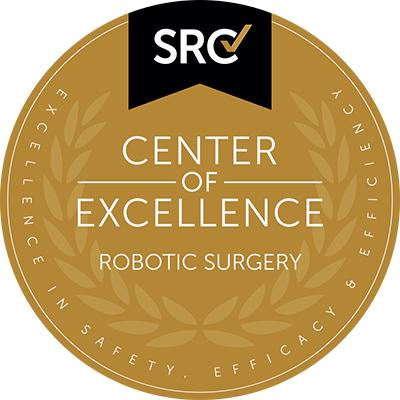
Marshall Health Network offers an innovative new treatment option for heart failure patients with the successful implantation of the Barostim™ device—the first of its kind in Huntington. The groundbreaking procedure was performed at St. Mary’s Regional Heart Institute by Dr. Nepal Chowdhury (below), a cardiovascular and thoracic surgeon specializing in advanced cardiac care.


Barostim™ is the first FDA-approved device for heart failure that uses neuromodulation, an advanced approach that engages the body’s nervous system to improve heart function. Unlike other treatments, Barostim™ doesn’t require hardware inside the heart. Instead, it gently stimulates sensors in the carotid artery, which signal the brain to help regulate critical functions like heart rate, blood pressure, and kidney performance. This unique method allows the heart to work more efficiently, easing symptoms and enhancing patients’ quality of life.
“Access to advanced technology like this is important to our patients and our community,” said Melissa Mielcarek, MSHA, MBA, FACHE, vice president of cardiology services at Marshall Health Network. “It gives patients with heart failure new hope, improving quality of life and restoring balance when medications alone aren’t enough.”
Heart failure is a chronic, progressive condition that affects nearly 7 million adults in the U.S., a number expected to rise significantly in the coming years. For many, symptoms like fatigue, shortness of breath, and swelling make daily activities difficult.
This powerful new tool is one of many that MHN offers in managing heart failure.
Did you know that nearly 1 in 5 strokes is caused by an irregular heartbeat known as atrial fibrillation (AFib)? It’s a condition that disrupts the heart’s rhythm and increases the risk of dangerous blood clots, especially in the left atrial appendage of the heart. For individuals with AFib, this risk is significant: they are five times more likely to suffer a stroke than those with normal heart rhythms.
For decades, the most common way to manage that risk was through long-term blood-thinning medications like Warfarin While effective, these medications come with challenges, including a heightened risk of internal bleeding, dietary restrictions, and the need for frequent monitoring
That’s where the WATCHMAN™ procedure comes in. It’s a minimally invasive treatment that offers protection from stroke without the need for lifelong blood thinners.

The WATCHMAN™ device is a small, umbrella-like implant placed in the heart’s left atrial appendage, where blood clots most often form in patients with AFib. Once implanted, it permanently seals off this area, preventing clots from entering the bloodstream and causing a stroke.
The best part? Clinical studies show that 96% of patients are able to stop taking blood thinners just 45 days after the procedure. That means greater freedom, fewer medications, and reduced risk of complications for most patients.
The team at St. Mary’s Regional Heart Institute proudly celebrated a major milestone: the completion of its 250th WATCHMAN™ implant by Dr. Esam Baryun—a significant achievement that underscores the hospital’s commitment to bringing advanced cardiac care close to home.
To learn more about the WATCHMAN™ procedure, call the St. Mary’s Structural Heart Clinic at 304.526.1645.
“Access to advanced technology like this is important to our patients and our community. It gives heart failure patients new hope, improving quality of life and restoring balance when medications alone aren’t enough.”
– Melissa Mielcarek, MSHA, MBA, FACHE, Vice president of cardiology services at Marshall Health Network
Dr. Nicolas Phan Reaches Milestone in SI Joint Surgery
Marshall Health Network neurosurgeon Nicolas Phan, MD (lower left), recently marked a major milestone with the successful completion of his 100th procedure using the SI-BONE® iFuse Implant System, a minimally invasive technique used to treat sacroiliac (SI) joint dysfunction. This often-overlooked condition is a common source of chronic lower back pain, and the iFuse procedure offers patients a proven path to long-term relief.

With this achievement, Dr. Phan reinforces his reputation as one of the region’s leading experts in SI joint care. The iFuse system allows for stabilization of the SI joint through a small incision, reducing recovery time and improving quality of life for patients who have often endured years of discomfort.
“This achievement demonstrates our commitment to providing leading-edge care for our patients,” said Dr. Phan, who serves as both associate professor and chair of neurosurgery at the Marshall University Joan C. Edwards School of Medicine. “It’s incredibly rewarding to see how this procedure transforms the lives of those who’ve lived with persistent pain for years.”
Board-certified and with nearly 30 years of experience, Dr. Phan joined Marshall Health Network in 2017. Since being named chair of the neurosurgery department in 2024, he has led its continued growth and expanded access to advanced neurological care in the region.
Lung cancer remains one of the deadliest forms of cancer in the United States, claiming more than 130,000 lives annually, according to the Centers for Disease Control and Prevention. In West Virginia, the risk is even higher, making early detection and intervention critical. When lung cancer is found in its earliest stages before it spreads, the five-year survival rate jumps from just 5 percent to an encouraging 56 percent.
While not all lung nodules (or “spots”) are cancerous, identifying which ones are is key. Traditionally, this involves a bronchoscopy to examine tissue from the lungs. Now, with the help of robotic-assisted technology, this process is becoming more precise, less invasive, and more effective.
Cabell Huntington Hospital (CHH) is among the first hospitals in the nation—and the only one in the Tri-State region—to use the Monarch® robotic bronchoscopy system. This advanced technology allows physicians to navigate deeper into the lungs with greater accuracy,

reaching areas that were once difficult or impossible to access. This year, CHH has performed more than 300 procedures, a significant milestone.
“Because this technology improves reach, vision and control for bronchoscopy procedures, it holds the potential to help diagnose cancer even earlier than before,” said Yousef Shweihat, MD, interventional pulmonologist at Cabell Huntington Hospital’s Center for Lung Health and St. Mary’s Regional Lung Center (above right). Dr. Shweihat is also an associate professor in the Department of Internal Medicine at the Joan C. Edwards School of Medicine. “I am excited about the promise of this technology to offer greater hope for patients diagnosed with lung cancer.”
By combining advanced robotics with the skill and dedication of our medical teams, CHH continues to lead the region in innovation, giving patients better tools and more time in the fight against lung cancer.
Marshall Health Network (MHN) believes high-quality health care should be within reach for everyone no matter where you live. That’s why we’re focused on expanding access and bringing compassionate, patient-centered care to more people across West Virginia, southern Ohio, and eastern Kentucky, especially in rural and underserved areas.
Whether it’s offering free screenings, adding new specialists, or bringing care into homes through virtual visits, we’re committed to meeting our communities where they are.
Colorectal, or colon cancer, is one of the most preventable types of cancer. Most cases occur in adults aged 45 and older, but many people still aren’t getting screened.
To help with that, MHN has partnered with Cologuard® to provide convenient, at-home screening kits. Last year alone, we distributed over 2,000 kits, helping increase screening rates by 20%. Regular screenings can detect polyps before they become cancerous and often lead to life-saving treatments.
For more information, visit marshallhealthnetwork.org/colonhealth.
Oral cancer can go unnoticed until it reaches an advanced stage, especially in areas where dental care is hard to access. That’s why Marshall Dentistry & Oral Surgery offers free oral cancer screenings to the public. These simple visual exams of the mouth, lips, and throat help detect potential concerns early, especially for people who use tobacco or have a family history of oral cancer.
For those facing dental pain, injuries, or other emergencies, our emergency walk-in dental clinic in Huntington is available Monday through Thursday, 8 a.m. to 12 p.m. at 1616 13th Avenue, Suite 200 – no appointment needed. The clinic is for anyone experiencing issues such as toothaches or severe pain, chipped or broken teeth, lost fillings or crowns, dental abscesses or infections, oral injuries or trauma.
To learn more, visit marshallhealth.org or call 304.691.1247.
Early detection of breast and cervical cancer saves lives. MHN offers mammograms at three convenient locations — Cabell Huntington Hospital Breast Health Center, St. Mary’s Breast Center and HIMG — so you can choose the one most convenient for you.
Each October during Breast Cancer Awareness Month, we host free screening events, offering clinical breast exams and discounted mammogram coupons. We also partnered with the College of American Pathologists (CAP) Foundation and FaithHealth Appalachia to offer a See, Test & Treat event providing free same-day mammograms and Pap tests for uninsured or underinsured women.

“Catching breast and cervical cancer early can literally save lives,” said Anne Hammack (left), Clinical Coordinator of the Breast Center at St. Mary’s. “We want women to know these services are available and accessible.”
And if you do receive a cancer diagnosis, we are ready to care for you with a comprehensive team of specialized physicians, surgeons, researchers, pharmacists and clinicians.
To schedule a mammogram or learn more, visit marshallhealthnetwork.org/breast health.
Lung cancer remains the leading cause of cancer-related deaths in the U.S., often beginning as a small spot or nodule that’s only detectable by X-ray or CT scan. While most nodules are harmless, some can evolve into cancer over time. That’s why early detection and follow-up are critical.
The Lung Nodule Program at MHN uses low-dose CT scans and AI-driven technology to detect, track and manage lung nodules over time and creates personalized care plans. Detecting these changes early gives patients more options and a better chance of recovery.
For more information, call 304.781.LUNG.
Skin cancer is the most commonly occurring cancer in the U.S., and early detection is key. Basal cell carcinoma and squamous cell carcinoma (nonmelanoma skin cancer) are the most common forms of skin cancer but are easier to cure than melanoma.
When skin cancer is found early, it can be treated more easily. That’s why MHN offers free annual skin cancer screenings to the community and recently teamed up with local partners to make sun protection more accessible.
“Preventing something as serious as melanoma is as simple as sunscreen. And when sunscreen is expensive, having it freely available is one more way we can support our community’s health.”
– Rory Chapman Executive director of FaithHealth Appalachia
FaithHealth Appalachia, with support from the Mountains of Hope Cancer Coalition and Cabell County Family Resource Network, placed free sunscreen dispensers in eight parks and pools throughout Cabell County.
Rory Chapman, executive director of FaithHealth Appalachia, says that it’s a simple solution to a big problem.
“Preventing something as serious as melanoma is as simple as sunscreen,” said Chapman. “And when sunscreen is expensive, having it freely available is one more way we can support our community’s health.”
To learn more, visit faithhealthappalachia.org.
We’re also expanding access to services that support long-term wellness of our youngest patients. Registered dietitian Rachel Sallade, M.S., R.D.N., L.D., recently joined Marshall Health to provide outpatient pediatric nutrition services.
She works closely with children and families managing chronic conditions like diabetes, gastrointestinal issues, endocrine disorders, and more. Pediatric dietitians are a key part of care teams—helping patients build healthy habits, manage deficiencies, and thrive.
You can learn more about this at: marshallhealth.org/services/nutrition-services
Rivers Health recently opened a new clinic in Gallipolis Ferry that brings two important services under one roof: Family Medicine and Occupational Medicine. This location offers primary care, injury treatment, drug and alcohol testing, pre-employment physicals, and more to help meet the needs of local employers and contractors.
“This clinic represents our commitment to the health and well-being of Mason County’s growing workforce,” said Dr. Adam M. Franks, Vice Dean for Rural Health at the Marshall University Joan C. Edwards School of Medicine.
“We recognized that integrating these services creates a seamless experience for both patients and employers,” said Scott Raynes, President & CEO, MHN. “It’s a direct response to the needs of our region’s workforce.”
For more information, visit marshallhealth.org/occupationalmed. To schedule an appointment with Rivers Health Family Medicine, call 304.857.3021.
Not all chest pain is a heart attack – but all chest pain deserves a closer look. Marshall Cardiology’s Rapid Access Chest Pain Clinic provides quick, thorough evaluations for patients with chest pain who:
• are not having a heart attack or active cardiac condition
• have no known ischemic heart disease and worsening symptoms
• need urgent evaluation
• have been seen within 48 hours in the ER at Cabell Huntington Hospital or St. Mary’s Medical Center
Located at the Erma Ora Byrd Clinical Center in Huntington, the clinic brings together a team of cardiologists and advanced practitioners to provide testing, diagnosis and treatment if needed or reassurance if no heart disease is found. Fast.
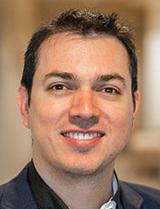
“Your heart is the body’s most important muscle. Any anomaly should be addressed quickly to prevent lasting damage. The Rapid Access Clinic speeds up the process for patients to find relief,” said Dr. Carlos Rueda (left), heart failure specialist at Marshall Health and assistant professor at Marshall University Joan C. Edwards School of Medicine.
The Rapid Access Clinic team includes Rueda, along with experienced cardiologist Ellen Thompson, MD, April Holley, APRN, FNP-BC, and Emily Kennedy, NP-C. They follow a team-based approach to get you answers as quickly as possible. The clinic is open Monday through Thursday at Marshall Cardiology, Erma Ora Byrd Clinical Center, 1249 15th Street, Huntington.
From early detection and virtual visits to pediatric care and rural outreach, Marshall Health Network is committed to breaking barriers and expanding access to care. Because everyone deserves high-quality health care, close to home. n
“Your heart is the body’s most important muscle. Any anomaly should be addressed quickly to prevent lasting damage. The Rapid Access Clinic speeds up the process for patients to find relief.”
–
Dr. Carlos Rueda Heart failure specialist at Marshall Health and assistant professor at Marshall University Joan C. Edwards School of Medicine.
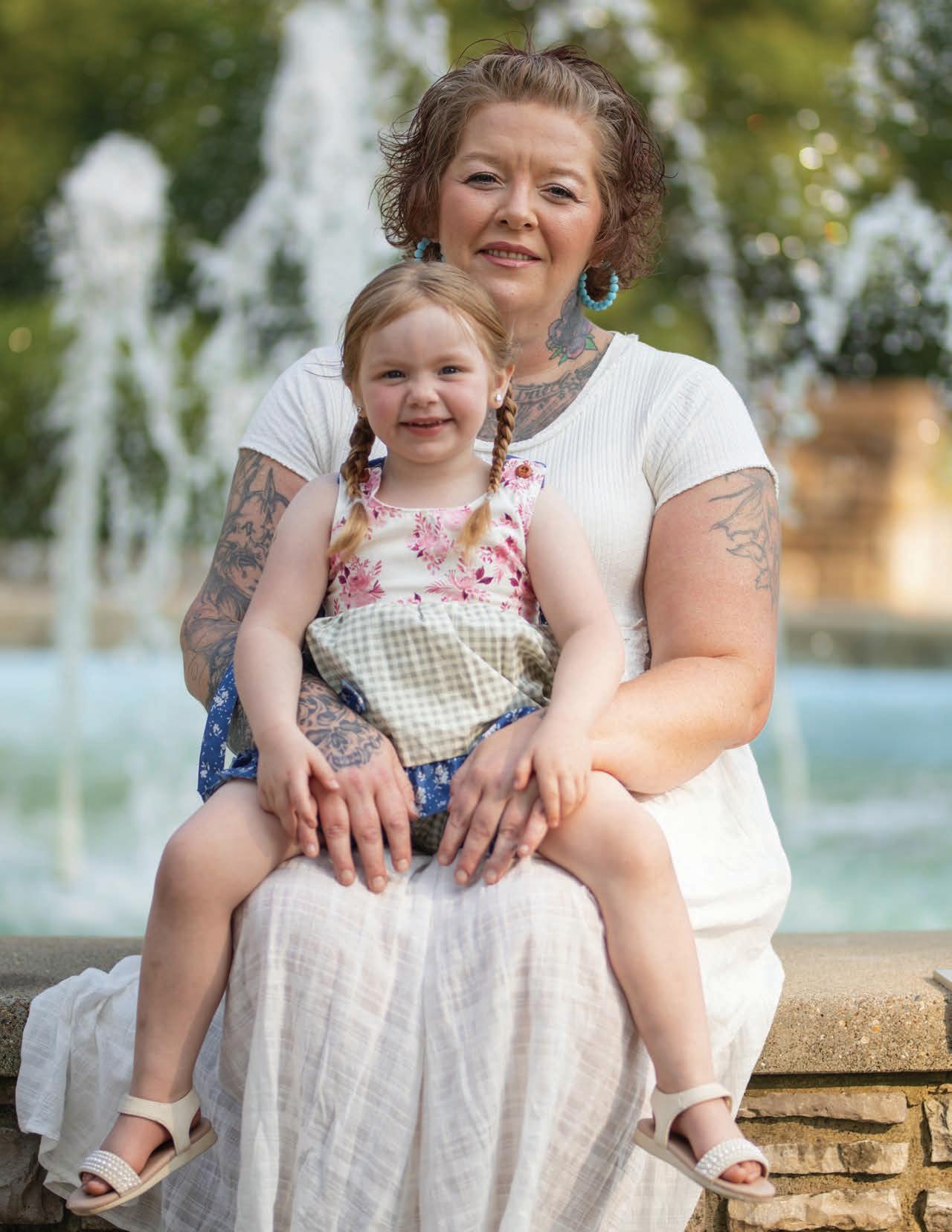
Marshall Health Network recovery programs for moms changes the course of mother’s life
Christina Langley, 42, vividly remembers the first time she took a drug intending to feel different.
She was 16 and was raising her first child. She had her wisdom teeth extracted and was prescribed hydrocodone by her orthodontist.
“When I took them, I felt like I could accomplish everything in my day – I felt great,” she said. “And at that point, I had just become a teen mom and was very overwhelmed with life. And boy, that little blue pill was an instant fix to my day.”
This set the tone for the next 20 years of her life, where she would lose everything she held dear, including herself.
But when she became pregnant with her fourth child, she knew she needed a change. That’s when she found the recovery programs for women at Hoops Family Children’s Hospital (HFCH) and Marshall Health (MH), and the course of her life changed.
That Little Blue Pill
Langley was born and raised in Logan County, West Virginia. The oldest child of a middleclass family, Langley said, looking back, she had an amazing childhood in a loving community. But as a young mother, the relief she felt from that little blue pill took over. By the time she graduated from Chapmanville High School in 2001, Langley said she was already a functioning addict, experimenting with oxycodone and cocaine.
“The next 20 years was a cycle of bad relationships, toxic men, and drug-fueled bad decisions that landed me in jail and prison three different times,” she said.
In 2017, Langley had the opportunity to come to Huntington, where she was introduced to the blossoming recovery community. That enabled her periods of sobriety, but it was hard to stay away from the relief of getting high.
God, for whatever reason, believed that I deserved another shot at this motherhood thing.
I was not going to take it for granted”
– Christina Langley
In 2020, Langley found herself pregnant with her fourth child.
“I knew I had to do something different because I did not want history to repeat itself,” she said. “I had remembered this program where my one-time sponsor, Ashley Ellis, worked at Cabell Huntington Hospital. I picked up the phone and called and explained to them that I was pregnant and I was using, and that I would like to get help. They put me through to the MARC program.”
The Maternal Addiction Recovery Center, or MARC, is a program that supports expectant mothers with substance use disorder. The team of experts who oversee the MARC program is committed to the safety and well-being of both mom and baby. MARC can provide medications, such as buprenorphine, to reduce cravings, one-on-one therapy and groups with other moms.
In MARC, Langley found a welcoming and non-judgmental circle. She participated in group therapy, where she learned to identify her triggers and coping skills to manage them. She also worked individually with a therapist, working through past trauma and Post-Traumatic Stress Disorder (PTSD).
MARC also prepared her and the other expectant mothers for the Neonatal Therapeutic Unit, or NTU, within Hoops Family Children’s Hospital (HFCH), where their babies would stay and recover from neonatal abstinence syndrome (NAS) after they were born.
On Aug. 12, 2021, Magnolia was born at the Maternity Center at Cabell Huntington Hospital.
“God, for whatever reason, believed that I deserved another shot at motherhood. I was not going to take it for granted,” she said. “I fell in love with her the moment I laid eyes on her. She was 7 pounds, 4 ounces, 20 inches of perfection. I made a vow, to myself and to God, that I would do whatever was necessary to be the best mother I could be – not only to her but to try and mend the relationships with my other children as well.”
Langley transferred from MARC to the Maternal Opioid Medical Support, or MOMS, program at HFCH. MOMS was developed to provide substance use disorder treatment services to postpartum women while their babies recover from NAS. Mothers in MOMS are housed adjacent to the NTU so they can bond with their babies, and they can stay in the program as long as they wish.
Magnolia would stay in the NTU for 29 days, where Langley said she received phenomenal care from the best nurses you could ask for.
“Those ladies are angels sent from God himself,” she said. “They took the time not only to get to know me but also to care for my whole family. They did not look down on me like I was some ‘junkie who failed her child,’ but as a mother who was struggling and was trying her best to get the help she needed.”
The NTU team helped Langley get a room at the Ronald McDonald House of Huntington on the campus of HFCH so she could be close and spend as much time with Magnolia as possible. The team helped her find inpatient treatment, a requirement of her Child Protective Services case, at another Marshall Health program, Project Hope for Women and Children, a comprehensive treatment facility for women and their children. And they included her in every part of Magnolia’s treatment.
Along with completing the program at Project Hope, Langley returned to MOMS, where she is still a participant today.
“I have a therapist that I have worked with many hours through grief and loss of Magnolia’s dad, past trauma, PTSD and the many things that kept me sick for many years,” she said. “We have group therapy where the moms have a place to come and have open conversations in a healthy way and get feedback. Because being a mother isn’t always easy, and we often find ourselves needing help and advice, we can find it at MOMS. We don’t feel judged or looked down upon for needing help or feeling overwhelmed. They understand – they get it.”
Langley isn’t just a participant in the recovery programs.
After two years of sobriety, she became a state-certified Peer Support Specialist and now works for Marshall Health in the MARC program.
“I get to work with women daily who are going through the exact same struggles I have been through, and it’s the most beautiful and rewarding thing,” she said.
Along with being the best mother she can be to Magnolia, Langley is also working to repair the relationships with her other children. She’s mending the relationship with her parents, as well.
“I am a dependable and reliable employee today. I know how to be a friend. Over the years I have built my recovery toolbox and it has many things in it from many areas – I have a sponsor and go to 12-step meetings and work steps.”
Langley has now been sober for more than four years.
“Those ladies are angels sent from God himself. They took the time not only to get to know me but also to care for my whole family. They did not look down on me like I was some ‘junkie who failed her child,’ but as a mother who was struggling and was trying her best to get the help she needed.”
– Christina Langley

Langley and Magnolia recently went to Washington, D.C., with Hoops Family Children’s Hospital representatives to share their story during Family Advocacy Day. Organized by the Children’s Hospital Association, of which HFCH is a member, members were encouraged and supported in meeting with congressional leaders along with a patient and family in order to raise awareness of the unique aspects of children’s hospitals as well as issues related to child health. One of the goals included advocating for Medicaid and the Children’s Health Insurance Program, or CHIP.
“None of my success would be possible without the services I received and support of Medicaid” she said. “I have my own insurance now through my employer, but for many years, I depended on Medicaid, and many others still do. The thought that it could change and the ladies I work with wouldn’t have the opportunity to heal and get sober and be happy, healthy mothers is just devastating to me. We cannot let that happen!”
If you are expecting and are having trouble stopping substance use now that you are pregnant, tell your physician immediately and contact MARC at 304.696.8700. Selfreferrals are encouraged. n
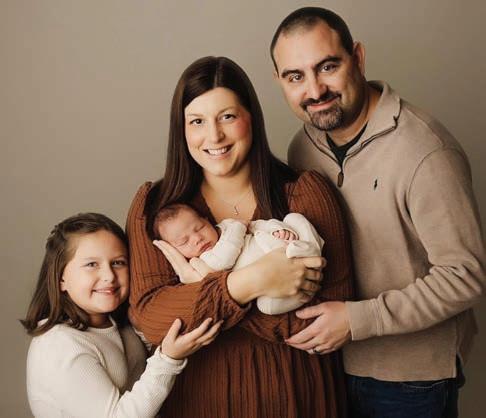
When her daughter woke up sick, Beverly Gagnon faced a familiar challenge: getting care quickly without disrupting work or exposing her family to crowded waiting rooms. Thanks to Tele-NOW Care, she didn’t have to choose.
With just a smartphone and a few minutes, Beverly joined a virtual visit from work while her daughter
stayed safely at home. A provider diagnosed her daughter and sent a prescription—all without anyone needing to leave the house.
Whether you’re a busy parent, a working professional, or just prefer the comfort of home, TeleNOW Care brings Marshall Health Network providers to you — from 8 a.m. to 8 p.m., 7 days a week.
• No waiting rooms
• No appointments needed
• Connect from home, work—or anywhere
• Perfect for common illnesses: cough, rash, flu symptoms & more Call 304.781.8353 to connect with a provider today. Tele-NOW Care is available to everyone! n
“Being able to participate in my daughter’s care while I was at work and she was at home was super easy.”
— Beverly Gagnon, RN, BSN St. Mary’s Medical Center
Marshall Health Network believes that caring for our community means more than providing excellent medical care — it means investing in partnerships and projects that address the broader needs of the people we serve.
That’s why we’re excited to look ahead to several key initiatives shaping a healthier future for Huntington and beyond.
Extensive renovations are underway to convert the historic Prichard Hotel in downtown Huntington into affordable senior housing with onsite health services. This project honors the building’s legacy while meeting a growing need for accessible, supportive housing for older adults in our region.
In partnership with city leaders and local faith-based organizations, efforts are also in motion to create a centralized location for homeless services named The Hub. This dedicated space will bring essential resources under one roof, where comprehensive care and support can be provided for those facing housing insecurity.
Additionally, HealthNet Aeromedical Services, in collaboration with Marshall Health Network and long-time aviation partner Air Methods, are planning for the arrival of a new Airbus H135 helicopter in December. The new aircraft will enhance emergency medical transport services across Central Appalachia, continuing a nearly 40-year mission of providing safe, life-saving care when it matters most.

These projects reflect our ongoing commitment to improve health access, strengthen community partnerships, and build a healthier future together. n


Cabell Huntington Hospital Among America’s
For the third consecutive year, Marshall Health Network - Cabell Huntington Hospital has been recognized as one of America’s 100 Best Hospitals by Healthgrades, placing us in the top 2% of hospitals nationwide. We are proud to be the only hospital in West Virginia and the surrounding region to achieve this honor.
We’re proud to celebrate our seventh consecutive year as one of America’s 250 Best Hospitals.
This distinction reflects our unwavering commitment to exceptional patient outcomes, safety, and quality care. Our dedicated team works tirelessly to ensure the highest standards, year after year.
When you choose Cabell Huntington Hospital, you’re choosing a nationally recognized leader in health care. Discover why we’re a Top 100 Hospital, visit MarshallHealthNetwork.org/about


It’s your health. Discover more personalized care. Whether you’re 16 or 66-and-holding, you’ve got a lot of living to do. More exploring new places. More savoring your favorite meals. More enjoying sunny days in the park. At Marshall Health Network, you’ll find the care and support you need to live your best life. More physicians, more options, more ways to keep you healthy. Discover more. Discover Marshall Health Network.